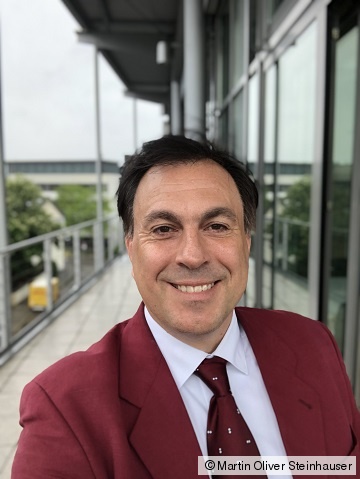Research of Prof. Dr. Martin Steinhauser
Prof. Dr. habil. Steinhauser's research topics and interests cover multiscale modeling and simulation of biological and soft matter systems as well as of hard condensed matter under shock wave loading. In detail, his research interests include the exploration of
- space research, particularly modeling and simulation of the impact of space debris with satellite structures,
- bio-membranes, macromolecular networks, biological cells, polymers and polyelectrolytes,
- failure of metals, ceramics and re-inforced composite materials under load and impact,
- multiscale and coarse-grained method development,
- shock wave physics,
- the mechanical destruction of cancer cells using shock waves,
- theoretical and numerical method development and high-performance scientific computing.
The overall aim of his research is to understand material behavior of soft and hard matter from a fundamental perspective taking into account
all relevant length- and time scales, ranging from the atomic scale to the macroscopic continuum viewpoint. A feature of Dr. Steinhauser's research
is the integrated use of simulation and experiment as well as the implementation of efficient, parallel algorithms and program development on
supercomputer systems. Dr. Steinhauser often uses interdisciplinary research approaches at the interfaces of physics, chemistry, biology,
engineering and computer science.
Techniques
My employed theoretical and computational techniques in materials research cover inter alia
- Clustering Algorithms
- Classical Molecular Dynamics
- Discrete Element Methods
- Mesh-free Simulation Methods
- Monte-Carlo Methods
- Coarse-Grained Simulations
- Smoothed Particle Hydrodynamics
- Finite Element Methods
- Voronoi Tesselations
- Power Diagrams
- Solutions to Big Data Problems
- Other Statistical Approaches
While my basic focus and expertise is on scientific simulation and new numerical method development, I have also employed suitable experimental techniques available at a Fraunhofer Ernst-Mach-Institute in Freiburg, Germany for testing and validating my theoretical and computational approaches. The principal experimental techniques that have been used in numerous projects for testing and validation of simulations of microstructural features of materials, include
- High-Speed Camera Systems
- Non-Destructive Testing Devices such as
- Scanning Acoustic Microscopy (SAM)
- Computed Tomography (CT)
- Atomic Force Microscopy (AFM)
- Scanning Electron Microscopy (SEM)
- Light and Flourescence Microscopy
- Laser Physics (pulsed nanosecond laser system)

Molecular Self-Assembly of Biological Bilayer Membranes
Molecular Self-Assembly of Biological Bilayer Membranes
Polyelectrolyte Complex Formation of Macromolecules
Polyelectrolyte Complex Formation of Macromolecules

